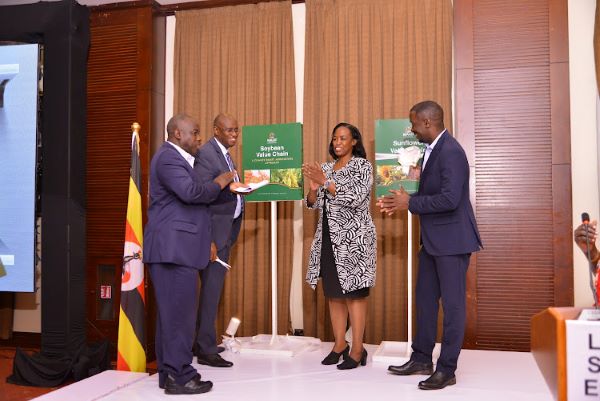Uganda’s Ministry of Agriculture, Animal Industry and Fisheries (MAAIF) has launched Climate Smart Extension Manuals designed specifically for potato, sesame, soybeans, and sunflower value chains in a bid to cushion the country’s agriculture sector against climate change challenges.
According to Major General David Kasura-Kyomukama, MAAIF Permanent Secretary, the four crops have been chosen based on their resilience to climate extremes in alignment with government National Development Plan III (NDPIII).
“These manuals will play very important role in attaining our sectorial objectives as depicted in our NDPIII. In this, our aim is to improve household incomes and livelihoods for our farmers by enhancing their resilience against adverse climate effects so as to improve food security and nutrition,” said Kasura-Kyomukama during the multi-stakeholder platform workshop in Kampala.
Minister of State for Animal Industry Hon. Lt. Col (Rtd) Bright Rwamirama said the manuals specially tackle climate challenges and equip farmers with climate smart knowledge which is evidence-based.
“This is to ensure that the farming community follow certain guidelines to make sure that they mitigate the effects of climate change and create resilience in their production system”, said Hon. Rwamirama.
In collaboration with development partners, including the SNV-Netherlands Development Organization, the technical experts of the ministry have developed manuals specifically designed to promote practices and technologies for climate-smart agriculture.
Phomolo Maphosa, the Country Director of SNV, emphasizes the significant challenge that climate change poses to Uganda’s agriculture sector, particularly given its heavy reliance on subsistence farming.
This sector is already experiencing the consequences of rising global temperatures, such as increased pests and diseases, water scarcity, and more frequent extreme droughts and flooding, which are anticipated to escalate in the future.
Maphosa highlights the SNV-led Climate Resilience Agribusiness For Tomorrow project (CRAFT) as a flagship initiative. The project aims to enhance the availability of accessible and climate-resilient food for the growing population of Uganda.
“We are actively collaborating with approximately 100,000 farmers within Uganda to ensure not only increased production and income but also resilience to climate shocks.”
The strategy involves providing extension workers with additional knowledge, enabling farmers to adapt to climate-smart farming technologies, enhance their agribusinesses, and strengthen their resilience to climate-related challenges.
This initiative targets 73 percent of the 18.2 million farmers, simultaneously contributing to the enhancement of the Parish Development Model.








